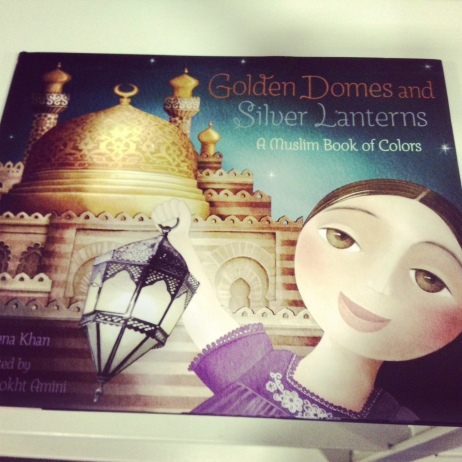
I grew up knowing I was different because of what my family believed. We were Christian, but we were outside of the mainstream enough that even as a kid, I stuck out. As an adult, I’ve chosen another minority belief: non-belief. The number of non-religious people is growing, but many people (myself included) still perceive a stigma to the point that we are careful to avoid the topic altogether or avoid using certain labels–like atheist, for example.
I watch my daughter play with her young friends, and I wonder what her experience will be like–how much it will match my own. She won’t have to go to the library during class holiday celebrations as I did, but she will at some point be set apart by what we have chosen. For as much as I am trying to create a safe space of exploration of science, religion, and philosophy for her, she will eventually encounter people who want to push her out of that safe space into one label or another. That thought makes me nervous.
 That thought is part of what the Books for Secular Families series is all about. I believe that education and stories are the first step to confidence and compassion. I grew up with stories, and I am grateful every day for my mom’s willingness to let me explore the world through stories so freely. It was in a story that I first encountered the idea of a non-religious family and the idea that a child’s spiritual identity could be separate from the family’s. Now, this is one of my core values. Everyone is on their own journey–even our children. Beliefs are not hereditary.
That thought is part of what the Books for Secular Families series is all about. I believe that education and stories are the first step to confidence and compassion. I grew up with stories, and I am grateful every day for my mom’s willingness to let me explore the world through stories so freely. It was in a story that I first encountered the idea of a non-religious family and the idea that a child’s spiritual identity could be separate from the family’s. Now, this is one of my core values. Everyone is on their own journey–even our children. Beliefs are not hereditary.
 As I read Sarah Dooley’s Body of Water, which is a novel aimed at middle schoolers, I wondered if my daughter would ever lie about our family’s beliefs to fit in, if she would be embarrassed to be outside the mainstream.
As I read Sarah Dooley’s Body of Water, which is a novel aimed at middle schoolers, I wondered if my daughter would ever lie about our family’s beliefs to fit in, if she would be embarrassed to be outside the mainstream.
In the book, twelve-year-old Ember has a lot she would like to keep secret. Her family is homeless as a result of a fire, and they are living at a campground for the summer. She lets the other kids at the campground think her name is Amber because that’s more normal than the nature-derived name her Wiccan parents gave her. Ember knows from experience that not everyone will be friends with someone whose family worship nature. My heart just about broke for the girl as I read her thoughts that if she wants any friends, she has to keep the spiritual part of her life to herself.
I think that any child in a family whose beliefs–religious, political, or whatever–are outside of the mainstream will be able to relate to Ember’s reluctance to share her family’s religion. Ember’s unsent letters to her former friend throughout the book offer an intro to Paganism as Ember gets her chance to say what she’s always wanted to say to the friend who shunned her because of her religion. It’s very informative. Paganism and Christianity have more in common than one might think, and Ember lets loose with the facts she usually keeps to herself.
I just wanted to take Ember and all the other children who feel pressured to be the same label as their friends or who have been shunned by anyone because of their or their family’s beliefs and keep them safe until we have created a world in which children don’t have labels and they don’t automatically get the one’s their parents have.
Let’s work on that one, okay?
—
Also pictured above: Girls Don’t Fly by Kristen Chandler (which I blogged about here) and Does My Head Look Big in This? by Randa Abdel-Fattah (which is about a Muslim teen who decides to start wearing a head scarf)
Disclosure: Amazon.com links are affiliate links. A portion of purchases made via these links earns a commission for this blog. Thanks for your support!
 Kate DiCamillo has won a Newbery Honor for Because of Winn-Dixie, the Newbery Medal for The Tale of Despereaux, the Geisel Honor for Mercy Watson Goes for a Ride, and more. So when she publishes a new book, the kidlit world pays attention. Flora & Ulysses has only been on shelves for about a week, and it already has four starred reviews and a spot of the National Book Award long list. That’s a good start, I must say.
Kate DiCamillo has won a Newbery Honor for Because of Winn-Dixie, the Newbery Medal for The Tale of Despereaux, the Geisel Honor for Mercy Watson Goes for a Ride, and more. So when she publishes a new book, the kidlit world pays attention. Flora & Ulysses has only been on shelves for about a week, and it already has four starred reviews and a spot of the National Book Award long list. That’s a good start, I must say.




















